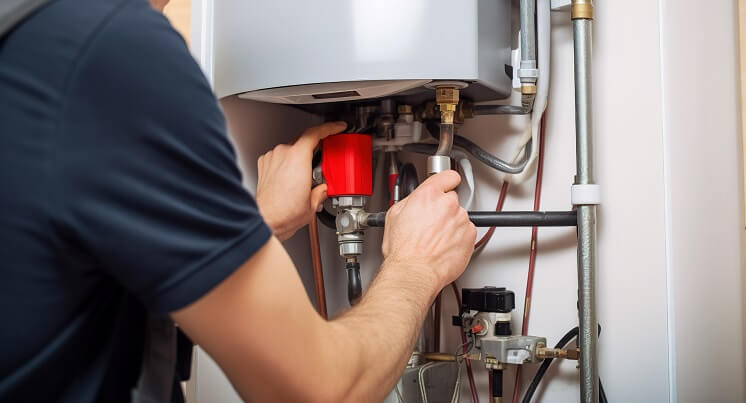An Introduction To Fixing Regular Water Heater Issues
An Introduction To Fixing Regular Water Heater Issues
Blog Article
The content listed below on the subject of Common Problems with Tank Water Heaters is especially interesting. Read it yourself and decide what you think about it.

Visualize starting your day without your routine warm shower. That already sets a bad tone for the rest of your day.
Every home requires a reliable water heater, yet only a few know just how to manage one. One very easy way to keep your water heater in leading shape is to look for faults routinely and also fix them as quickly as they appear.
Keep in mind to switch off your water heater prior to sniffing around for mistakes. These are the hot water heater faults you are probably to run into.
Water too hot or also cold
Every hot water heater has a thermostat that establishes how hot the water gets. If the water entering your residence is also warm regardless of setting a hassle-free optimum temperature level, your thermostat could be faulty.
On the other hand, too cold water may be due to a failed thermostat, a busted circuit, or inappropriate gas circulation. For example, if you use a gas water heater with a busted pilot burner, you would get cold water, even if the thermostat is in excellent problem. For electric heaters, a blown fuse might be the perpetrator.
Not enough hot water
Hot water heater come in lots of dimensions, depending on your hot water needs. If you lack warm water before everybody has actually had a bath, your water heater is also tiny for your family size. You should consider setting up a larger hot water heater storage tank or going with a tankless hot water heater, which occupies less area and is extra resilient.
Strange sounds
There go to the very least five kinds of noises you can speak with a hot water heater, but the most common interpretation is that it's time for the hot water heater to retire.
To start with, you ought to recognize with the typical seems a water heater makes. An electric heater may sound various from a gas-powered one.
Standing out or banging noises normally indicate there is a slab of sediment in your tanks, and also it's time to cleanse it out. On the other hand, whistling or hissing sounds might merely be your valves letting some pressure off.
Water leaks
Leakages could originate from pipes, water connections, shutoffs, or in the worst-case scenario, the container itself. Gradually, water will wear away the container, as well as find its way out. If this happens, you need to change your water heater asap.
However, before your modification your entire container, be sure that all pipes are in location which each shutoff functions perfectly. If you still need assistance determining a leakage, call your plumber.
Rust-colored water
Rust-colored water suggests among your water heater elements is worn away. Maybe the anode pole, or the container itself. Your plumber will certainly have the ability to recognize which it is.
Warm water
Despite just how high you established the thermostat, you will not get any type of hot water out of a heating system well past its prime. A hot water heater's effectiveness may decrease with time.
You will additionally obtain lukewarm water if your pipelines have a cross connection. This means that when you turn on a tap, warm water from the heating unit streams in together with regular, cold water. A cross connection is very easy to place. If your warm water faucets still follow closing the water heater shutoffs, you have a cross connection.
Discoloured Water
Corrosion is a major cause of unclean or discoloured water. Corrosion within the water storage tank or a failing anode pole could trigger this discolouration. The anode pole safeguards the container from rusting on the inside as well as need to be checked yearly. Without a rod or a properly working anode pole, the warm water quickly rusts inside the storage tank. Call a professional water heater service technician to identify if replacing the anode pole will certainly take care of the trouble; otherwise, change your hot water heater.
Verdict
Preferably, your hot water heater can last ten years before you need an adjustment. Nonetheless, after the 10-year mark, you might experience any one of these faults much more frequently. At this point, you should include a brand-new water heater to your spending plan.
How To Troubleshoot 3 Common Water Heater Problems in Twin Cities
The Water Heater Is Leaking
A leaky cold water inlet valve A loose pipe fitting A leaky temperature and pressure relief valve A corroded anode rod A cracked tank Turn Off Your Water Heater:
Shut off your gas water heater by turning the gas valve on the unit to the “OFF” position. Shut off your electric water by switching its power off at your electrical panel. Look for a two-pole breaker labeled “water heater” and turn it to the “OFF” position. Move the ball valve connected to the water heater to be perpendicular to the piping at a 90° angle. Look for the Leak:
Depending on whether the water is coming from the tank's top or bottom, you’ll want to look for the leak in different locations.
If the leak comes from the top of the tank, carefully look for water escaping from the cold water inlet valve or loose pipe fittings. Rusted hot and cold water valves can have loose connections with the tank, with water leaking out of them.
https://mspplumbingheatingair.com/blog/how-to-troubleshoot-3-common-water-heater-problems
We were made aware of that editorial about Common Problems with Tank Water Heaters from an associate on our other web address. Feel free to set aside a second to distribute this blog if you enjoyed reading it. Thanks for your time. Visit again soon.
Premium service for plumbing emergencies. Report this page